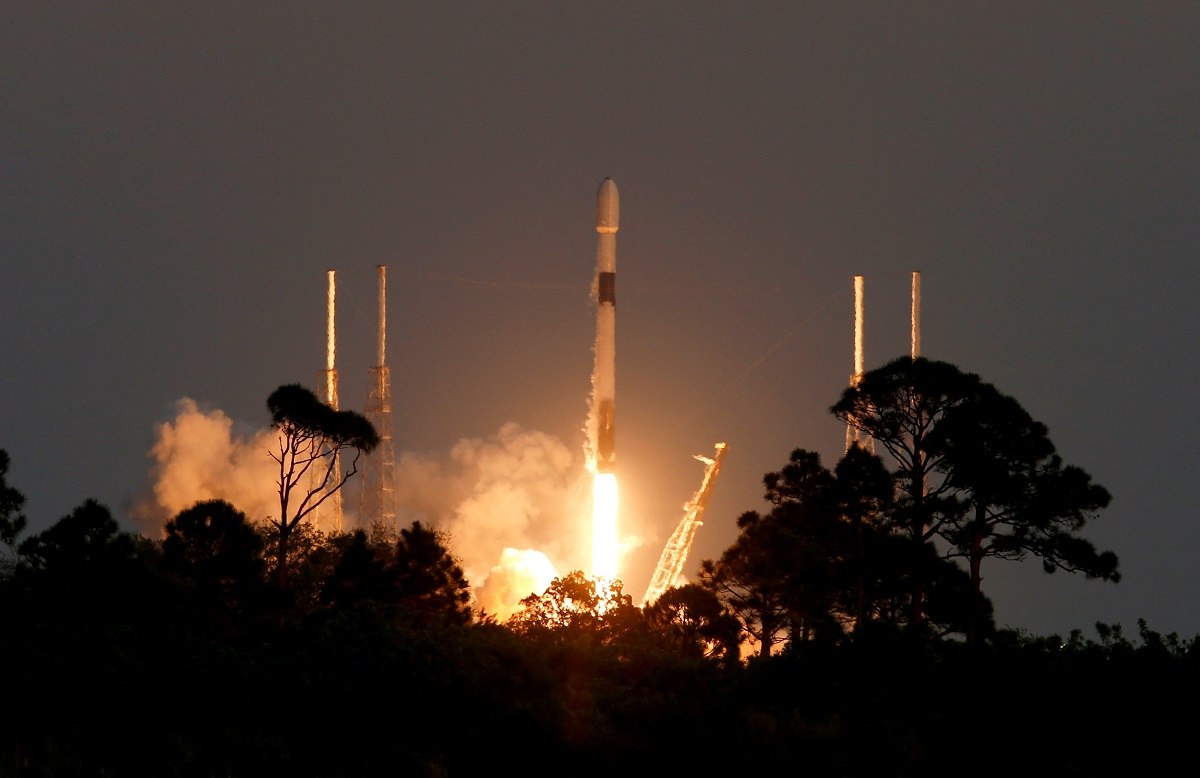Future World Order: Industrial policies / Public, Private Sectors in Japan to Work Together in Space Security; Space Security Initiative Provides Guidance for Collaboration

A SpaceX Falcon 9 rocket lifts off with a payload of 21 Starlink satellites from the Cape Canaveral Space Force Station in Cape Canaveral, Florida, in February.
21:00 JST, November 2, 2023
This is the third installment of a series that reports on security-focused, public-private industrial policies.
Public-private collaboration has begun in the field of space, which is drawing attention as a new national security field. In June, the government compiled its first Space Security Initiative. Taro Sato, 43, a former Air Self-Defense Force colonel who played the central role in compiling the document, now works in the private sector and leads public-private collaboration.
“The main point of the Space Security Initiative is that it calls for both strengthening defense capabilities and also developing relevant industries,” Sato said enthusiastically at an online conference on space cooperation between Japan and the United States held by the U.S. Center for Strategic and International Studies in September.
The initiative is a set of guidelines on the use of space over the next 10 years with regards to national security. Worried that Japan was lagging behind other countries in space strategy, Sato insisted that the government should create such guidelines, but the necessity was not understood very well at the beginning.
The turning point was Russia’s February 2022 invasion of Ukraine. Ukraine used information from private satellites operated by U.S.-based space company SpaceX and others to help counter the Russian military, vividly demonstrating that space is crucial to national security. With this in mind, the initiative stipulates “the application of commercial space technology to the security sector,” clearly advocating cooperation between the public and private sectors.
Japan has some of the most advanced space technologies in the world. In September, Japan launched a rocket that contained a lunar lander. However, since there has been no public-private cooperation in this field, many space-related companies have had nothing to do with the security sector and are wondering how to use their advanced technologies.
Sato resigned from the ASDF in summer and established a consulting company in September to provide advice on security needs and other information for such companies. “If this situation continues, foreign companies will dominate the market. The Japanese space industry will not develop and defense capabilities will not be strengthened. I think the next five years will be crucial,” Sato said.
The removal of space debris is essential for the safe operation of satellites. A Japanese company is regarded as the world’s best in rendezvous and proximity operations (RPO), which allows for space debris to be more accurately and safely approached. The Tokyo-based company, Astroscale Holdings Inc., was established in 2013. The company attracts attention internationally and the company’s U.S. subsidiary signed September an agreement with the U.S. Space Force to deliver a prototype for its refueling satellite by 2026.
Various countries are in fierce competition over RPO technology. China and Russia are using the technology to develop “killer satellites” that will be capable of destroying other countries’ satellites. For the United States, which is becoming increasingly vigilant, the strengthening of the capabilities of its Space Force is an important issue in order to achieve “space domain awareness (SDA)” — the ability to monitor the satellites of other countries.
Astroscale Chief Executive Officer Mitsunobu Okada, 50, said, “All space technologies are dual use. We would like to ensure transparency [in terms of how to use them].”
Top Articles in Politics
-

Japan PM Takaichi’s Cabinet Resigns en Masse
-

Sanae Takaichi Elected Prime Minister of Japan; Keeps All Cabinet Appointees from Previous Term
-

Japan’s Govt to Submit Road Map for Growth Strategy in March, PM Takaichi to Announce in Upcoming Policy Speech
-

LDP Wins Historic Landslide Victory
-

LDP Wins Landslide Victory, Secures Single-party Majority; Ruling Coalition with JIP Poised to Secure Over 300 seats (UPDATE 1)
JN ACCESS RANKING
-

Japan PM Takaichi’s Cabinet Resigns en Masse
-

Japan Institute to Use Domestic Commercial Optical Lattice Clock to Set Japan Standard Time
-

Israeli Ambassador to Japan Speaks about Japan’s Role in the Reconstruction of Gaza
-

Man Infected with Measles Reportedly Dined at Restaurant in Tokyo Station
-

Videos Plagiarized, Reposted with False Subtitles Claiming ‘Ryukyu Belongs to China’; Anti-China False Information Also Posted in Japan
























